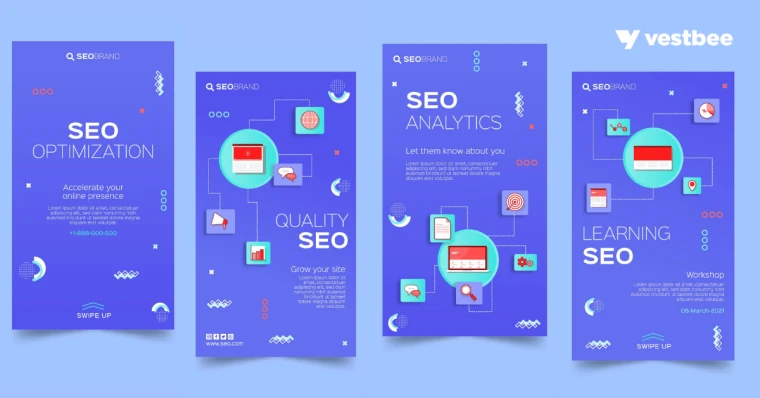If your startup is active online, you probably heard of SEO and if not - it’s definitely a high time to catch up. Ready? Let’s start from the beginning. SEO stands for Search Engine Optimization and, as the abbreviation suggests, it’s a process of improving your website by mainly focusing on keywords in order to increase visibility for potential visitors in Google search engines.
You may ask why you should even care about using specific words in your content and your startup’s website position on the search engines. That’s why we prepared the overview of the most important reasons showing that SEO is actually an integral part of your startup’s success and you should include it in your digital marketing strategy!
SEO boosts your startup website position
Now when you know what SEO is, it’s time to learn how it actually works. Ever wondered why you can find some companies indexed by Google in the first position on SEPRs (Search Engine Results Pages - pages displayed by search engines in response to a user's query) while some of them don’t even make it to the top 10 search results?
Most popular search engine Google displays 10 organic results on the first page and this is where you want to be placed. Organic results which are unpaid entries in a search engine results page are showing up in a certain order based on the algorithm used by the search engine - remember that the higher your startup is positioned on SERP the higher chances for your website to be visited by potential customers. As most users decide to check only the first few results, your goal should be to rank your startup on the first search page. Every search engine has a certain algorithm responsible for website positioning, although it is impossible to know exactly how those algorithms work, a lot is already discovered thanks to years of experience and research. Matt Cutts from Google mentioned that there are over 200 variables in the algorithm grouped into a couple of factor categories such as a domain, page-level and site-level factors, backlinks, user interactions, on-site and off-site webspam factors.
One of the most common SEO practices is using keywords that are suitable for your company and which your audience will probably type in during the search. Other practices include backlinks building which refers to placing links from outside domains that point to pages on your domain and site's backend structure, upgrading focused on site speed, site architecture and security. If defined and used correctly, those strategies can significantly boost a startup's position in SEPRs.
SEO improves user experience
SEO not only benefits your startup’s SEPR, but it also influences user experience. While crawling your website, user experience is among the factors that help position your startup web page in top results in search engines. So it’s crucial for your startup to create a UX-friendly website in order to strengthen its position and brand awareness, encourage customers to purchase products or services and make them come back in the future. Otherwise, if your website doesn't look clear and its navigation is unintuitive, users will probably go back to the SERPs and choose a different result - your competitors. I’m sure you heard the phrase less is more, so keep your web page simple which definitely will help users find what they are looking for with fewer clicks and make them satisfied with the smooth buying process.
Your site speed is also another factor that can influence SEO and user experience - there is a correlation between page speed depending on HTML code volume, JavaScript file weight, images and videos loading time, etc., and customers' decisions on purchasing from a website. Moreover, usually the majority of traffic comes from mobile users so make sure to become more mobile-friendly. Pay attention to that, especially, because in September 2020 Google switched to mobile-first indexing for all websites, which means that mobile-friendly web pages are better positioned in SERPs.
SEO builds the online credibility of your startup
By using SEO you can build a solid foundation for your brand. Running continuous communication with customers in order to keep them updated and show your care can build trust and a strong relationship with them. Clean, contentful and engaging websites on which users spend more time are positioned higher on SERP - the algorithm recognizes them as more valuable for potential visitors. So make sure to include on your website everything that can be useful for a potential customer, don’t focus only on your offer but include information about the company itself e.g. how to contact you, what is the mission of your startup, or what are your successes and activities.
The valuable content should get along with the appearance of your website - design and website’s clarity is your showcase that convinces visitors to stay on your website and explore the offer while the information provided is the one that makes them stay longer. Those two elements are the key in building loyalty and trust with your customers. Just remember that it’s impossible to gain online credibility overnight - SEO strategy is a process and to use it in the most beneficial way for the company you need time to learn and adjust. But the outcomes will definitely be worth it.
SEO helps reach your target customers more efficiently
When your startup customers are looking for something on a search engine they use certain keywords to find what they need. By implementing SEO you can create relevant content that will meet the requirements of your potential customers and attract people who your product or service is dedicated to. Remember that keywords and phrases suitable for your business can filter the audience and bring you quality leads that later will turn into a final purchase so don’t neglect them. When targeting the right visitors with relevant keywords that match your audience’ interest, your startup can attract people who are genuinely interested in your offer, therefore, they spend more time on your website, boost traffic and further influence the positioning of your website on search engines. Using keywords only because they are ranked better won’t bring you new customers and can even backfire. If the product or service doesn’t meet visitors’ needs they will leave immediately so your website engagement will be poor resulting in an increased bounce rate (the percentage of users that left the website after viewing only one page). Your startup’s website can perform way better by building the inbound strategy and nurturing your leads on many different levels regarding your target group.
SEO helps in creating more relevant content
Creating up-to-date content is important since it helps you to stay in touch with your audience. However, it’s easy to get lost in the information buzz so make sure your content is interesting, engaging and it complements the main business goal of your startup. SEO can surely help with that - using the right keywords keep your communication relevant, catchy and meaningful. Creating interesting and relevant content can assist you in building and maintaining an audience that is more engaged than some random user, builds quality traffic, and seems more loyal and more willing to buy the offered products or services. So think of SEO-oriented content as a long-term strategy for attracting a relevant audience for your startup. And remember, that your posts and content stay on the web and gradually build a comprehensive base of knowledge around your focus so after time passing, it will surely bring quality traffic to your page and boost engagement. Interesting content raises engagement and is more likely to be shared by other users or websites which can help you build a backlink profile that boosts your online visibility.
SEO leverages cost-effective attitude
When building a startup you need to be resourceful and keep all costs down. As SEO doesn’t require huge investments from your side, implementing its basic strategies like targeting relevant keywords is a good place to get started - it basically costs nothing and the results can bring more quality traffic to your website than paid ads and different marketing campaigns. Remember about SEO at every step of your conversion funnel, and treat all of your sub-pages as complementary instruments. And when your company is ready to use SEO on an advanced level it can be the right timing to consider support from marketing agencies or professional SEO tools - both can prompt the best direction and help your startup with SEO optimization.
Ready to take your startup’s SEO to the next level?
Now you know how important SEO is in the digital marketing strategy of your startup so if you want to implement it right away we have great news for you! Vestbee partners up with SEMrush providing CEE startups with the best all-in-one SEO tool in the world which will help you improve SEO, paid traffic, social media strategy, content & PR and beat your competitors.
We have a 30-day FREE trial for you and a special offer for annual plans for approved startups. Join Vestbee now and get access to the best startup deals, leading investors and corporates!
Related Posts:
VC Tips For Successful Startup Fundraising (by Magdalena Balcerzak, Manager, Vestbee)
Overview Of Top Funding Sources To Grow Your Startup (by Kaja Dubielska, Vestbee)
A Bunch Of Tips On Pitching Your Startup To Investors (by Olga Chechłacz, Editor, Vestbee)







